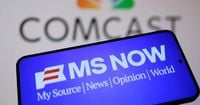MSNBC, the progressive cable news network that has been a fixture in American media since 1996, is preparing for one of the most sweeping changes in its history. On August 18, 2025, the network announced it will rebrand as My Source News Opinion World, or MS NOW, marking a pivotal moment as it spins off from NBCUniversal and the Comcast media empire, according to Deadline, Variety, and Axios. The rebranding is set to take effect later this year, coinciding with the network’s transition into a new standalone company called Versant, led by media executive Mark Lazarus.
This move, which will see MSNBC shed its iconic Peacock logo, is more than just a cosmetic overhaul. It represents a fundamental shift in the network’s identity and ambitions. In a memo to employees, MSNBC President Rebecca Kutler explained, “During this time of transition, NBCUniversal decided that our brand requires a new, separate identity. This decision now allows us to set our own course and assert our independence as we continue to build our own modern newsgathering operation.”
The rebranding is part of a much broader strategy by NBCUniversal to draw a clear line between the cable networks it is spinning off—MSNBC, CNBC, Golf Channel, GolfNow, and SportsEngine—and the parent company that will retain the Peacock branding. Mark Lazarus, now CEO of Versant, reinforced this in his own message to staff: “The peacock is synonymous with NBCUniversal, and it is a symbol they have decided to keep within the NBCU family. This gives us the opportunity to chart our own path forward, create distinct brand identities, and establish an independent news organization following the spin.”
For MSNBC, the change is particularly significant. Since its launch as a joint venture between NBC and Microsoft, the network has carved out a unique space in the media landscape, especially after Microsoft divested its stake in 2005. Over the years, MSNBC has become known for its progressive opinion journalism and a roster of high-profile hosts. But the new era as MS NOW is intended to signal a break from its NBC roots—and a step toward a more self-defined future.
The network’s leadership is adamant that, despite the new name and look, its core mission remains unchanged. Kutler reassured staff and viewers alike, writing, “While our name will be changing, who we are and what we do will not. Our commitment to our work and our audiences will not waiver from what the brand promise has been for three decades.” She also promised a “broad-based marketing campaign, unlike anything we have done in recent memory,” to roll out the new brand later in 2025.
Yet, if the intent was to foster clarity, the announcement produced its fair share of confusion and even derision online. Commentators and social media users quickly pointed out that the “MS” in MS NOW originally referred to Microsoft, a company no longer associated with the network for more than a decade. Some critics, like Semafor’s Josh Billinson, joked, “MS NOW sounds like a short-lived Windows operating system from the early 2000s that needlessly redesigned too much and failed to be adopted by a critical mass of users.”
Others zeroed in on the new logo, with self-described “political junkie” Russell Drew quipping that it “looks like it belongs on a discount computer from 1998, not a serious news network. Absurd.” The rebranding also inadvertently sparked a trending topic on X (formerly Twitter), as users noted the unfortunate association of “MS NOW” with multiple sclerosis. “Sounds like a medical issue,” one user remarked, while “multiple sclerosis” shot up to the No. 4 trending topic in the U.S. that day.
Former MSNBC anchor Keith Olbermann, never one to shy from commentary, weighed in with a historical perspective. He recalled that the “MS” branding has long been a source of confusion, stating, “That was an issue that has now been doubled (‘NOW? Like the National Organization For Women?’).” Olbermann, who left the network in 2011, added, “I’m glad to see that my interoffice mail envelope finally got to the 52nd floor of 30 Rock.”
Questions also swirled around the network’s digital identity. The domain “msnow.com” is currently dedicated to snowmobiles (with text in Korean and English), and “ms-now.com” redirects to a meal-delivery service affiliated with Martha Stewart. As of the announcement, it remains unclear where the new MS NOW will live online—a detail that will need urgent addressing as the rebrand approaches.
Not all changes are confined to MSNBC. As part of the Versant spin-off, CNBC will keep its name but introduce a new logo, according to Lazarus. Sports programming on USA Network and Golf Channel will be unified under a new brand, USA Sports, with their own fresh logos. These changes are all set to roll out in tandem with the spin-off at the end of the year.
Behind the scenes, MSNBC has been rapidly expanding its news operation in anticipation of the transition. The network has hired prominent journalists such as Carol Leonnig, Catherine Rampell, and Jackie Alemany, as well as Jacob Soboroff, Vaughn Hillyard, and Antonia Hylton, to bolster its reporting ranks. Kutler noted that the network has been recruiting for nearly 100 roles, emphasizing the ambition to “supercharge our non-linear products” across platforms like YouTube, TikTok, audio, digital, and live events.
The rebranding does carry risks. Media observers have drawn parallels to Warner Bros. Discovery’s recent rebranding debacle, when “HBO Max” became simply “Max,” only to revert after public backlash. Some worry that dropping the familiar MSNBC name could erode brand loyalty or cause confusion among viewers accustomed to the old moniker.
Still, network leaders are betting that the time is right for a bold new identity. As Rachel Maddow, MSNBC’s top anchor, observed on the Pivot podcast, “We’re spinning off with a huge standalone, newly built news gathering organization that is designed specifically for our purposes and nothing else. We have an incredibly loyal, very large audience, and we’re universally platformed on a device called the television, which Americans use, despite media reports to the contrary.”
For now, millions of viewers and the broader media industry will be watching closely as MS NOW takes shape. The stakes are high, but so is the potential for a network that, after nearly three decades, is finally stepping out from the shadow of its corporate parent to forge its own path.






